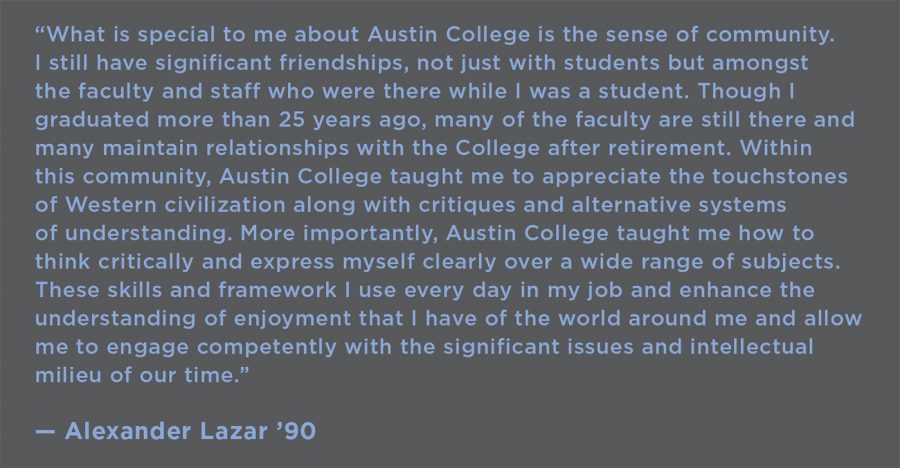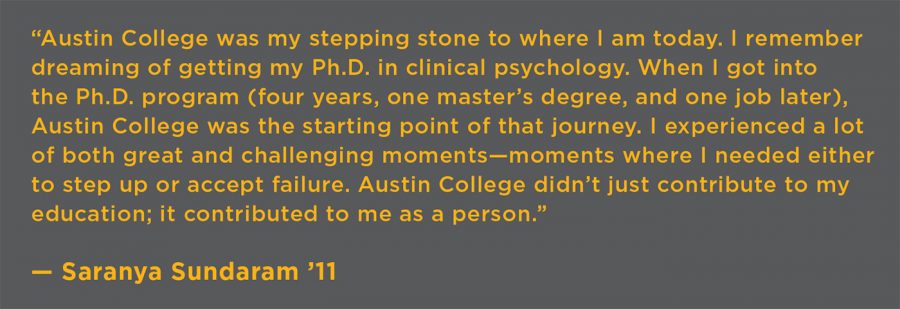By: Leigh-Ellen Romm
 In today’s society, questions abound about the value of higher education, particularly liberal arts education. Those who have experienced a quality liberal arts education have ready responses. They realize the value of their college experiences and understand the “takeaways” that enhance their lives. And, the people who work and live alongside those individuals witness the value, too.But this article is not about proving the value of the liberal arts. It’s about alumni who live out their liberal arts education every day: creative thinkers, outstanding communicators, compassionate leaders, and engaged citizens who know how to collaborate to analyze a situation and create solutions that work. Their educational experiences equipped them to be change agents in their world, and they have stepped into action.This article tells the stories of five Austin College alumni who “walk the walk,” living the liberal arts in their professional and personal lives—in different walks of life and a variety of settings. Working to better the world and themselves, these individuals bring healing, beauty, shelter, and hope to others. In today’s society, questions abound about the value of higher education, particularly liberal arts education. Those who have experienced a quality liberal arts education have ready responses. They realize the value of their college experiences and understand the “takeaways” that enhance their lives. And, the people who work and live alongside those individuals witness the value, too.But this article is not about proving the value of the liberal arts. It’s about alumni who live out their liberal arts education every day: creative thinkers, outstanding communicators, compassionate leaders, and engaged citizens who know how to collaborate to analyze a situation and create solutions that work. Their educational experiences equipped them to be change agents in their world, and they have stepped into action.This article tells the stories of five Austin College alumni who “walk the walk,” living the liberal arts in their professional and personal lives—in different walks of life and a variety of settings. Working to better the world and themselves, these individuals bring healing, beauty, shelter, and hope to others. |
Andrea Keith ’08
Executive Director and Co-Founder of LaAsociacion CREAR
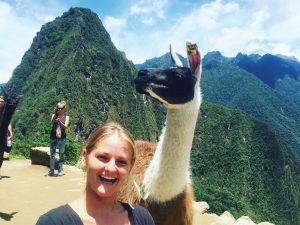 Andrea Keith is in her happy place. As executive director and co-founder of La Asociacion CREAR in Samara Playa, Costa Rica, she’s found the beautiful balance of helping young people develop—and living on the beach.
Andrea Keith is in her happy place. As executive director and co-founder of La Asociacion CREAR in Samara Playa, Costa Rica, she’s found the beautiful balance of helping young people develop—and living on the beach.
“I was not a very adventurous kid,” Andrea said. “I was terrified before my first JanTerm trip to Costa Rica in 2006. Then something magical happened, and I arrived here and I wasn’t homesick; I was just in awe of how beautiful this place is. I remember thinking, why would I wake up and look at a polluted city, when I could look at this natural beauty?”
She decided to return for a study abroad semester at the National University of Costa Rica in Heredia in fall 2006. She stayed through that term, extended into JanTerm … was approved to remain for the spring term … and then, she stayed for the summer. She was essentially home.
“Costa Rica just works for me. I am in love with being able to speak the language I worked so hard to learn. At first I was young and making all kinds of mistakes—but learning from them. It all has contributed to making me who I am now. “
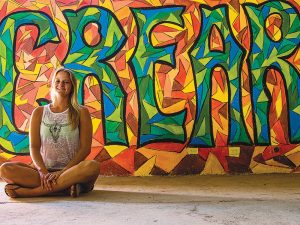 “I have a busy mind so I need the slower-paced lifestyle. I need that quality of life where I work super hard and then I find time to relax and enjoy,” Andrea said. “My main goal is to be happy, and Costa Rica just makes me really happy all the time.”
“I have a busy mind so I need the slower-paced lifestyle. I need that quality of life where I work super hard and then I find time to relax and enjoy,” Andrea said. “My main goal is to be happy, and Costa Rica just makes me really happy all the time.”
She “works super hard” at La Asociacion CREAR, a nonprofit organization serving the communities around Playa Samara and Guanacaste, Costa Rica. Costa Rican children are in public school only three hours a day, 87 days a year. CREAR fills many hours with instruction in English, art, and technology. A recently developed Girls Empowerment program teaches girls skills that lead to confidence and build their worldview.
“Life in a rural town in Central America is challenging in a number of ways,” Andrea said. “We don’t have access to Wal-Mart or Hobby Lobby—so we really have to think outside the box when it comes to creating activities for the kids. We have to be flexible and open-minded, and understand that things are different here. We never seem to have everything we need, so we are always problem solving and looking at things from a different angle. It’s what I sort of love and hate about my job. My friends and I always remind ourselves that it isn’t life or death, so there really isn’t any need to stress too much.”
It may not be life or death, but to the young people she is teaching how to learn, how to break down barriers, and how to express themselves creatively, it comes close. High school graduation rates in Samara Playa have risen as a result of Andrea’s team leadership and organization of visiting volunteers.
The Universidad Latina recently presented Andrea the 2015 Premio Yo Creo (I Believe) Award in recognition of young social entrepreneurs in Costa Rica. The application included a rigorous selection process with a presentation to a panel of five judges from Costa Rica. Upon winning, Keith received $2,500 for her organization, membership in Youth Action Net, and a trip to Honduras for professional development.
Visit La Asociacion CREAR to learn more.
Alexander Lazar ’90
Research Physician, MD Anderson
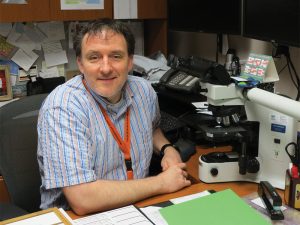 The “Knowledge Doubling Curve” suggests that human knowledge is capable of doubling every 12 months. In the year 1900 it took 100 years. Dr. Alexander (Faulkner) Lazar, co-director of the Surgical Pathology Fellowship Program at University of Texas MD Anderson Cancer Center, says abilities to communicate and think through complex situations, and constant willingness to retrain are needed to succeed.
The “Knowledge Doubling Curve” suggests that human knowledge is capable of doubling every 12 months. In the year 1900 it took 100 years. Dr. Alexander (Faulkner) Lazar, co-director of the Surgical Pathology Fellowship Program at University of Texas MD Anderson Cancer Center, says abilities to communicate and think through complex situations, and constant willingness to retrain are needed to succeed.
“Things rapidly cycle,” Alex said, “so you have to be open-minded just to keep up. Regardless of the field, we are all working in a knowledge economy. Everything is information at some level. As a physician and pathologist, I’m studying information to make a diagnosis and to understand cancer—to see how it works. You do your gathering and then figure how to deliver what you now know—in a paper, at a conference, or talking with a colleague in the hall.”
Alex came to Austin College in 1986 knowing he wanted to pursue an M.D./Ph.D. He had already worked in biomedical research as a high school student and earned a scholarship to Austin College from the King Foundation. So, he took all the required math and science for medical school, but beyond that, he pursued a balanced load with majors in philosophy and political science. One-third social science, one-third humanities and one-third physical science equaled a valuable liberal arts education for him.
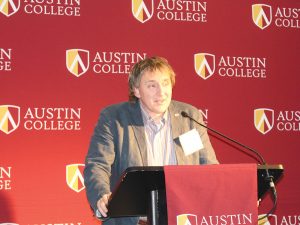 “I took evolutionary biology at Austin College,” he said. “That’s not particularly relevant to medical school but I was interested in it. As I’ve progressed, I find I use those same kinds of models to determine how cancer works. Natural selection and genetic variation are key in the study. That unlikely background from my coursework at Austin College has been helpful in my work today.”
“I took evolutionary biology at Austin College,” he said. “That’s not particularly relevant to medical school but I was interested in it. As I’ve progressed, I find I use those same kinds of models to determine how cancer works. Natural selection and genetic variation are key in the study. That unlikely background from my coursework at Austin College has been helpful in my work today.”
Alex also spent hours as co-director in Dr. Kenneth Street’s social Science Lab. “A lot of surveys passed through the lab, and we did fairly complex statistical analysis, particularly during election years, handling polling of local candidates, including the mayor of Sherman and local congressional districts. That coursework taught me how to structure data, and I use that knowledge now with genomic data,” he said.
“On a broader application, I have to concentrate very hard at my work,” Alex said, “and it’s also important to be able to step aside and read and be open-minded to things that are interesting. I can fairly readily pick up something, learn more, and really enjoy many topics. The liberal arts education exposes you to more and allows you to develop many interests. And, that will help you stay sane and focused because you have the tools to approach all kinds of people and situations. For instance, I’m particularly interested again in the political process. It’s not my work, but it is intrinsic to who I am.”
Kevin Peterson ’01
Artist
 Kevin Peterson’s award-winning painting titled “Fire,” with almost photographic details, makes you lean in a little to understand what’s going on—lean in and feel the tension of a child, arms wide, on a backdrop of destruction. “My work is about the varied journeys we take through life,” Kevin said. “It’s about growing up and living in a world that is broken.”
Kevin Peterson’s award-winning painting titled “Fire,” with almost photographic details, makes you lean in a little to understand what’s going on—lean in and feel the tension of a child, arms wide, on a backdrop of destruction. “My work is about the varied journeys we take through life,” Kevin said. “It’s about growing up and living in a world that is broken.”
The painting was awarded the prestigious 2015 Hunting Art Prize, an annual competition sponsored by Hunting PLC, an international oil services company, and open to Texas artists. The prize awards $50,000 to bring recognition and support to the career of a distinguished artist. Peterson has been a finalist for the Hunting Prize four other times. As a 2001 Austin College graduate, he learned his technical skills while majoring in art and psychology.
“Honestly, I didn’t know what I wanted to do with my life after I graduated high school, and I don’t think that is uncommon,” Kevin said. “I feel like a liberal arts education is perfect for a student in that situation. You’re going to be exposed to a bunch of different subjects, and you will have an opportunity to find what interests you the most.”
“I was interested in working in the psychology or social work fields,” Kevin said. “I also majored in art mainly because I always had a love for creating art. I was not sure at the time it was a viable career path, but I wasn’t worried about that; I just did it because I loved it.” Initially, Kevin did pursue social work as a probation officer in Austin for three years. Then life handed him some perspective, and he determined his passion was worth pursuing.
 Exploring and learning through the liberal arts teaches students self-awareness. That, plus confidence and a good dose of courage brought Kevin back to his paint brushes. “As a working artist, I would say ‘success’ is when you have a large enough audience that’s sufficiently interested in your work to allow you to create whatever you want whenever you want.”
Exploring and learning through the liberal arts teaches students self-awareness. That, plus confidence and a good dose of courage brought Kevin back to his paint brushes. “As a working artist, I would say ‘success’ is when you have a large enough audience that’s sufficiently interested in your work to allow you to create whatever you want whenever you want.”
Now, with a large following in his home city of Houston, he also exhibits in Germany, California, New York, and Florida. He works out of Winter Street Studios near downtown Houston in a renovated furniture factory.
“The nice thing about a liberal arts education is that you are exposed to tons of different disciplines,” Kevin said. “Just being technically proficient in painting or sculpture is not enough to be a successful artist. You have to bring something new conceptually to the work. Of course, I did get technical training with an art major, but I also learned about psychology, sociology, philosophy, and history. I have no doubt that being exposed to all those different areas of study had a positive theoretical effect on my work.”
To see more of Kevin’s work, visit Kevin Peterson Studios or Think Space Gallery.
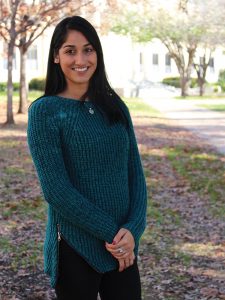 Saranya Sundaram ’11
Saranya Sundaram ’11
Ph.D. Student, Palo Alto University
Saranya Sundaram, a student in the Palo Alto University Clinical Psychology Ph.D. program, now stands on the threshold of her dream. Just a few years ago as an entering freshman at Austin College, she considered looking behind other doors, and the diversity of the liberal arts education gave her the experience she needed to find her direction.
“My first consideration was to become a medical doctor,” she said. “My parents are both doctors, and they encouraged me to give it a try. And, I did. While I did enjoy the classes, I couldn’t really feel as passionate about the career as I wanted. I felt passion with psychology, so I decided to pursue that route.”
Saranya was motivated to seek out research and clinical opportunities. She talked to mentors and psychologists for help and guidance. “I was able to create an independent research project with Dr. Helfrich from the ground up, work with a team and observe clinical skills,” Saranya said. Michele Helfrich, adjunct assistant professor of psychology, advised Saranya on a project that examined the accuracy of eyewitness testimony between video versus picture lineups.
“She collaborated with me, but more so challenged me to take the lead and see what I could do,” Saranya said. “It helped me learn several skills: being independent, yet collaborative, open-minded, and comprehensive.”
 With a clearer picture of her life’s direction and practical opportunities, including an internship at Applied Psychology Group of Texoma, she was accepted into the prestigious master’s program in clinical counseling at the University of Texas Southwestern Medical Center and completed her degree program there.
With a clearer picture of her life’s direction and practical opportunities, including an internship at Applied Psychology Group of Texoma, she was accepted into the prestigious master’s program in clinical counseling at the University of Texas Southwestern Medical Center and completed her degree program there.
Saranya continues her studies now at Palo Alto where her critical and analytical skills help her to succeed. Using the same independent judgment that pointed her to clinical psychology, she said she hopes to narrow her specific career path from clinician, researcher, or professor. For now, she is gaining intensive research and clinical training in many populations. Saranya has worked as a volunteer with Big Brothers Big Sisters and as a crisis counselor with the Suicide and Crisis Center of North Texas. She has come to care deeply about children, education, health, and the alleviation of poverty.
“I had no idea what I could do in the future with a liberal arts degree in psychology, but that’s exactly what Austin College gave me,” she said. “It helped me find that I could pave that path for myself. I experienced rigorous information, challenging professors, disheartening moments: these also are in my real world today. I can succeed in education, career, and as a person. I wouldn’t be the same person I am had I not gone to Austin College.”
Larry Sykes ’66
Volunteer, The Bridge
 Perspective can refine a person’s focus and make solutions clear. Larry Sykes has put more than 800 hours of focus into volunteering at The Bridge in Dallas and in 2015, received The Bridge Builder Award for working to solve the problem of homelessness. After a 32-year career in banking and commercial real estate, Larry connected his experience with a future that needed it.
Perspective can refine a person’s focus and make solutions clear. Larry Sykes has put more than 800 hours of focus into volunteering at The Bridge in Dallas and in 2015, received The Bridge Builder Award for working to solve the problem of homelessness. After a 32-year career in banking and commercial real estate, Larry connected his experience with a future that needed it.
The Bridge is a homeless recovery cooperative that brings together volunteer groups, government agencies, and social services to end adult, long-term homelessness. By solving complex problems with innovative solutions, The Bridge provides assistance for employment seekers, housing seekers, and those who need shelter day and night. Volunteers have helped more than 1,200 people out of homelessness.
Larry began his volunteer work in 2005 at The Stewpot, a mission of First Presbyterian Church in Dallas and a partner with The Bridge. Working through the Community Voice Mail program, he helped clients obtain a phone number and personally recorded voicemail before the days of free cell phone programs. Users could pick up messages from any phone with a PIN code. Individuals without addresses were reachable by prospective employers, doctors, and family. “This gave them dignity and hope for their future even if they were sleeping under the highway bridge,” Larry said. “They were connected.”
Larry also has worked with the Texas Workforce Commission lab at The Bridge to help guests find employment. He now spends time every week running The Bridge library. “My time in the library allows me to interact with guests and assist them in accessing resources that can help them move from The Bridge to their own places. Then they become our neighbors!”
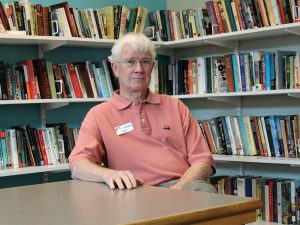 Larry’s service work began years ago. Larry and five other Austin College students traveled to England through the Winant Clayton program to work with non-profits. “I was in London at an organization that helped youth and seniors in a blue-collar area near the London Docks,” he said.
Larry’s service work began years ago. Larry and five other Austin College students traveled to England through the Winant Clayton program to work with non-profits. “I was in London at an organization that helped youth and seniors in a blue-collar area near the London Docks,” he said.
Believing that social awareness can and should be taught in college, Larry said that during his college years, the emphasis was on service abroad rather than at home. “Many Austin College students went on to the ministry, the Peace Corps, teaching, medicine, law, and government service after college. Clearly, something happened during our time at Austin College because today we have 15 to 20 Austin College graduates from the mid-’60s involved with service to the Dallas homeless community. Austin College gave me the courage to try new careers and new ways of solving problems, which certainly has carried over to my social work.”
Larry Sykes was honored with an Austin College Distinguished Alumni Award in 2011.
Visit their website to learn more about the work of The Bridge.


